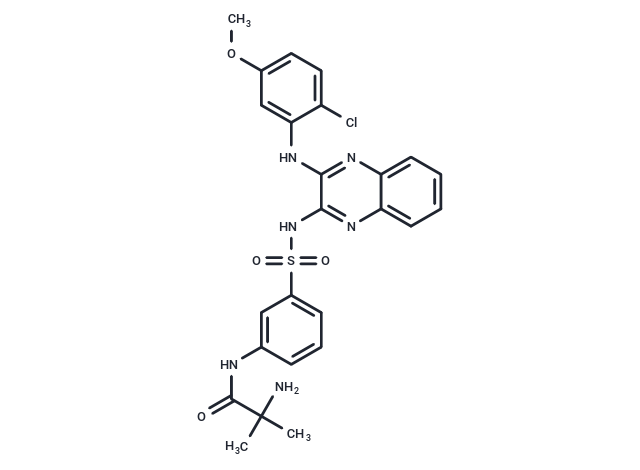Shopping Cart
- Remove All
 Your shopping cart is currently empty
Your shopping cart is currently empty

Pilaralisib (XL-147) is an orally available small molecule that selectively inhibits the activity of phosphoinositide-3 kinase (PI3K). Pilaralisib has been used in trials studying the treatment of Cancer, Lymphoma, Solid Tumors, Glioblastoma, and Breast Cancer, among others.

| Pack Size | Price | Availability | Quantity |
|---|---|---|---|
| 2 mg | $45 | In Stock | |
| 5 mg | $63 | In Stock | |
| 10 mg | $117 | In Stock | |
| 25 mg | $197 | In Stock | |
| 50 mg | $297 | In Stock | |
| 100 mg | $415 | In Stock | |
| 1 mL x 10 mM (in DMSO) | $81 | In Stock |
| Description | Pilaralisib (XL-147) is an orally available small molecule that selectively inhibits the activity of phosphoinositide-3 kinase (PI3K). Pilaralisib has been used in trials studying the treatment of Cancer, Lymphoma, Solid Tumors, Glioblastoma, and Breast Cancer, among others. |
| Targets&IC50 | PI3Kγ:23 nM, PI3Kα:39 nM, PI3Kβ:36 nM, PI3Kδ:36 nM |
| In vitro | Pilaralisib exhibits cytotoxic activity in Pediatric PreClinicalal Testing Program (PPTP) cell lines, with a median relative IC50 value of 10.9 mM (range 2.7 mM to 24.5 mM).[2] |
| In vivo | In BALB/c nu/nu mice, Pilaralisib (100 mg/kg, p.o.) induces tumor growth inhibition for solid glioma xenografts. Pilaralisib is well tolerated, with only 0.7% toxicity rate in the treated groups, similar to that observed for control animals.[2] In athymic female mouse, Pilaralisib (100 mg/kg, p.o.) significantly delays tumor growth without significant drug-related toxicity.[3] |
| Kinase Assay | In vitro kinase inhibition assays: Kinase activity for PI3K isoforms is measured as the percentage of ATP consumed following the kinase reaction using luciferase–luciferin-coupled chemiluminescence, with ATP concentrations approximately equal to the Km for each respective kinase. Kinase reactions are initiated by combining test compounds, ATP and kinase in a 20 μL volume. PI3Kα, PI3Kβ, PI3Kγ, and PI3Kδ final enzyme concentrations are 0.5, 8, 20, and 2 nM, respectively. Of note, 0.5 μL dimethyl sulfoxide (DMSO) containing varying concentrations of the test compound is mixed with 10 μL enzyme solution (2×concentration). Kinase reactions are initiated by the addition of 10 μL of liver phosphatidylinositol and ATP solution (2×concentration). Assay concentrations for VPS34, ATP, and phosphatidylinositol are 40 nM, 1 μM, and 5 μM, respectively |
| Cell Research | Cell proliferation is measured by using MTT or pre-mixed WST-1 reagent. For MTT/WST-1 assays, 10,000 cells/well are seeded in 96-well plates. 24 h after plating, cells are treated with DMSO or pilaralisib. After 5 days of treatment, MTT/WST-1 assays are performed.(Only for Reference) |
| Alias | XL-147, SAR245408 |
| Molecular Weight | 541.02 |
| Formula | C25H25ClN6O4S |
| Cas No. | 934526-89-3 |
| Smiles | COc1ccc(Cl)c(Nc2nc3ccccc3nc2NS(=O)(=O)c2cccc(NC(=O)C(C)(C)N)c2)c1 |
| Relative Density. | 1.458 g/cm3 (Predicted) |
| Storage | Powder: -20°C for 3 years | In solvent: -80°C for 1 year | Shipping with blue ice. | |||||||||||||||||||||||||||||||||||
| Solubility Information | Ethanol: < 1 mg/mL (insoluble or slightly soluble) DMSO: 93 mg/mL (171.9 mM), Sonication is recommended. | |||||||||||||||||||||||||||||||||||
Solution Preparation Table | ||||||||||||||||||||||||||||||||||||
DMSO
| ||||||||||||||||||||||||||||||||||||

Copyright © 2015-2025 TargetMol Chemicals Inc. All Rights Reserved.